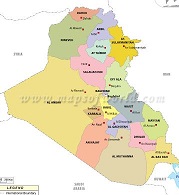The populist Iraqi cleric Muqtada al-Sadr, who led the Shia Islamist Sadrist bloc to a shock victory in the October 2021 elections, prompted heightened political instability in the country in 2022 by announcing his withdrawal from both the process of forming the next government and from Iraqi politics in general. Sadr’s decision to send his followers to invade Iraq’s parliament
Read MoreOn December 9, 2017, the prime minister of Iraq, Haider al-Abadi, said: ‘We have accomplished a very difficult mission. Our heroes have reached the final strongholds of Daesh [Islamic State] and purified it.’ Many argued that this moment, following the defeat of the last remnants of Islamic State in Iraq, would usher in a rebuilding and ‘post-conflict’ stage for the country.
Read MorePoliticians have failed to form a new government nearly a year after the last elections. Baghdad just saw its worst militia clashes in years. And despite vast oil wealth, the state can’t provide basic services. BAGHDAD — On most days in the Iraqi capital, jackhammers and electric drills provide the soundtrack to a construction boom, with multistory restaurants taking shape a
Read MoreSummary In July 2022 Iraq marked its longest period without a government since an election, exceeding its previous record of 289 days. A caretaker government is in place, however. As of August, it is now more than 320 days since the 2021 elections, and political uncertainty has continued to grow. In June 2022, the largest Shia political bloc in the Iraqi parliament, led by
Read MoreThe Shiite leader ended the deadly rioting in the Green Zone, but his shortcomings as both a cleric and politician have culminated in disaster. Sadr’s career has been built on the legacy of his father and uncle, two of the most revered Shiite religious authorities of their generation. While he lacks their erudition and religious credentials, and had no governmental experienc
Read More





